How to keep your account from getting hacked
What for: So that attackers cannot crack it.
A Google account lets you synchronize music, photos, contacts, and other data across devices. However, if it is hacked, criminals will gain access to all of that data. Another danger is that if someone has access to your Google account, they can remotely lock out any connected devices and erase all data from them.
Make sure that your account is protected by a strong password that complies with the following requirements:
- Is at least 8 characters long;
- Contains lowercase and uppercase letters, numbers, and special characters ($, @, etc.);
- Is not an actual word or easy-to-guess phrase;
- Is not the same as your passwords for any other accounts;
- Does not consist of information that strangers could easily find out (your name, date of birth, pet's name, and so forth — or those of your friends or relatives).
To change the password:
- Open Settings on your device;
- Go to the Google section;
- Tap Manage your Google account;
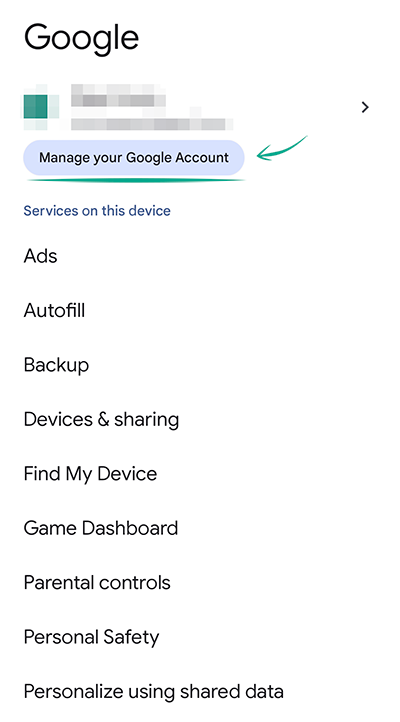
- Scroll to the right until you get to the Personal info tab;
- Select Password;
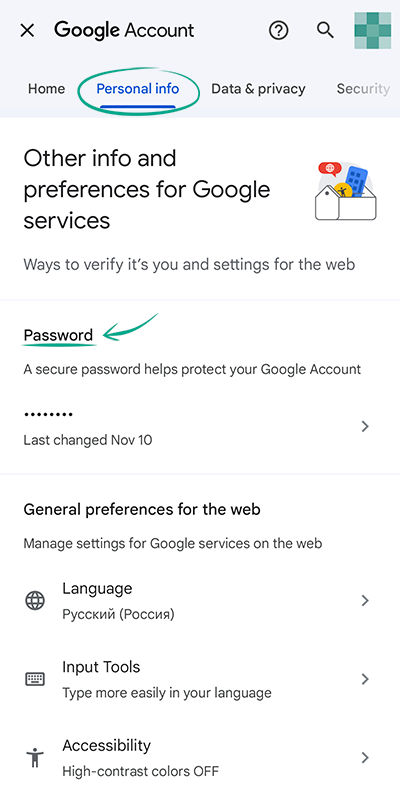
- Confirm your identity;
- Enter a new strong password twice and tap Change password.
What for: So you definitely don't get hacked.
You can increase the security of your Google account by enabling two-step verification. Every time you try to log in from a new device, the system will ask for a one-time code. A notification will be sent to all gadgets that are already logged in to that account. Thus, even if someone tries to hack your account, you will still be able to prevent them from logging in.
You can verify a login:
- Using a trusted device. When you try to log in to an account from an unknown device, a message will appear on the phone with your Google account asking you to verify the login. You'll find a list of devices that have attempted to log in but are awaiting verification on the Settings page;
- Using a one-time code received by text or a phone call;
- Using your phone's built-in security key. Please note that embedded electronic keys are supported only by devices with Android 7.0 or later. For them to work, the phone must be located next to your PC, and Bluetooth must be enabled on both devices.
To enable two-step verification using a trusted device:
- Open Settings on your device;
- Go to the Google section;
- Tap Manage your Google account;
- Scroll to the right until you get to the Security tab;
- Tap 2-Step Verification;
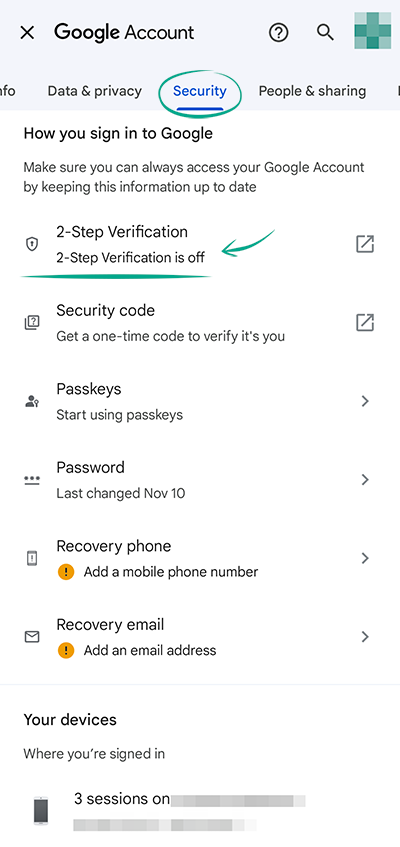
- Tap Get started;
- Enter your Google account password, or use your fingerprint, facial recognition, or screen lock. Tap Next;
Google will suggest two-factor authentication with your phone: When you try to log in to your account on a new device, messages will be sent to your logged-in devices.
- Check that the device is on the list;
- Tap Continue;
- You will be offered to add a backup sign-in method. To do this, enter the phone number that you want to use to receive text messages or phone calls with codes;
- Choose how you want to receive the code (SMS or Pone Call) and tap Next;
- Enter the code that you received by text or voice message and tap Next;
- Tap Turn on.
If you do not want to use this method, choose a text message or phone call as the means of verification:
- Tap Show more options;
- Select Text message or voice call;
- Enter the phone number that you want to use to receive SMS messages or phone calls with codes;
- Choose how you want to receive the code (SMS or Pone Call) and tap Next;
- Enter the code and tap Next;
- Tap Turn on.
To enable two-step verification using a security key, in the same section:
- Tap Show more options;
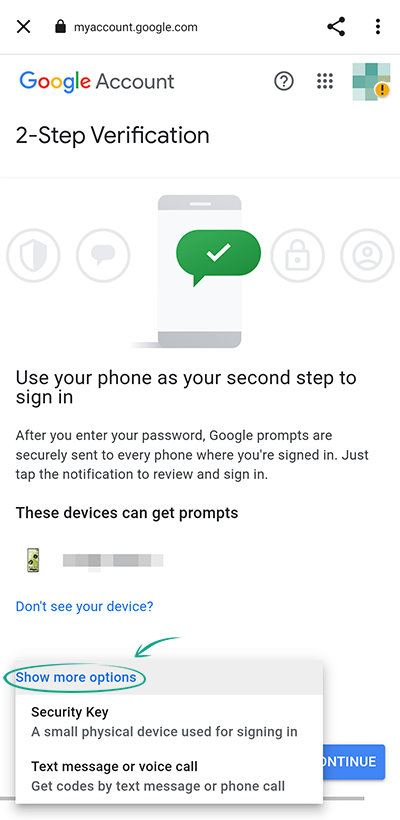
- Go to the Security key section with the name of your device and tap Done.
After you have enabled two-step verification, you can add several more login methods:
- Using backup codes that work even if your phone is not available;
- With the Google Authenticator app.
Use a trusted device, an incoming phone call, a special app, a security key, or backup codes for secure additional verification; A text message with the code can be intercepted by infecting the smartphone with malware or by exploiting a communication protocol vulnerability.
What for: To prevent hackers from changing your account password.
The identity verification feature protects your account from being hacked. For example, if a hacker wants to take over your account, they can try to reset your password and create a new one. But before, you must complete a verification step of your choice:
- Text message sent to your phone number;
- E-mail sent to your backup e-mail address.
We recommend that you activate all methods for the highest level of security:
- Open Settings on your device;
- Go to the Google section;
- Tap Manage your Google account;
- Scroll to the right until you get to the Security tab;
- Under Signing in to Google, enter:
- One or several phone numbers where you can be reached;
- A backup e-mail address.

What for: So your device does not get infected with malware.
Enhanced Safe Browsing is a feature that runs in the background, collecting and checking in real time information about websites you visit. It can protect your device from malware infection and makes web browsing safer.
To enable this feature:
- Open Settings on your device;
- Go to the Google section;
- Tap Manage your Google account;
- Scroll to the right until you get to the Security tab;
- Tap Manage Enhanced Safe Browsing;
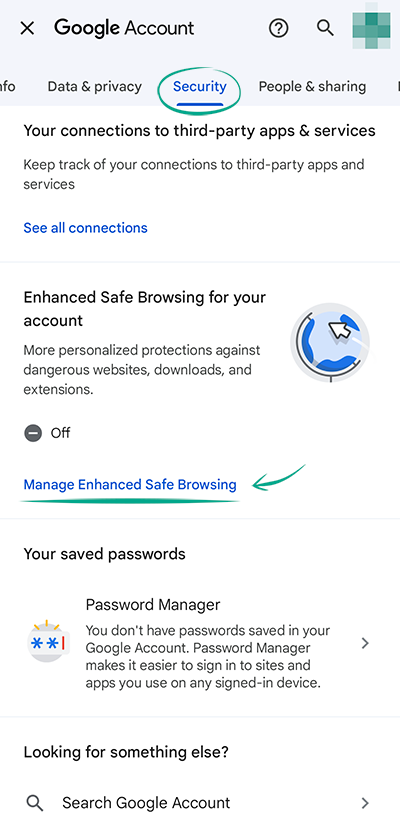
- Slide the toggle switch to enable Enhanced Safe Browsing.
Downside: This feature can collect data and send it to Google to use for protecting other users. To find out exactly what types of data is used, tap Learn more on the page with the Enhanced Safe Browsing toggle.
How to keep corporations out of your business
What for: To prevent your movements from being stored on Google servers.
Google may save a list of all the locations where you have been. This location log is used to choose targeted ads, perform searches, and some other functions. For example, this option lets you automatically receive information about traffic jams between your home and workplace. If you do not want your travel information to be saved on Google servers, you can clear this log and stop adding to it:
- Open Settings on your device;
- Go to the Google section;
- Tap Manage your Google account;
- Scroll to the right until you get to the Data & privacy tab;
- Tap Location History under History settings;
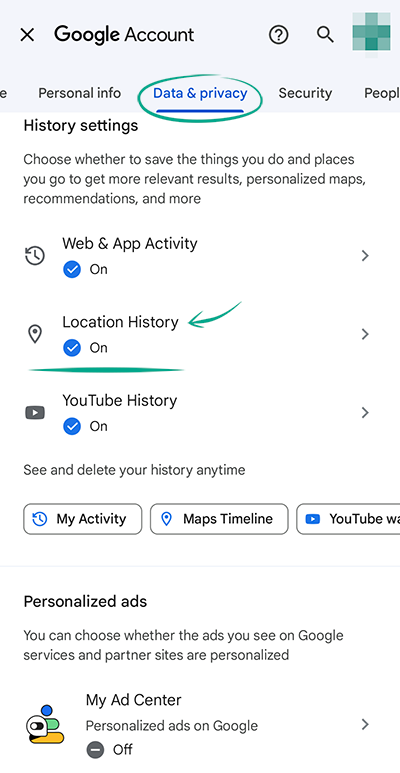
- Scroll down the page and tap TURN OFF.
To delete your location history, perform the following steps in the Data & privacy section:
- Tap Maps Timeline in the History settings section;
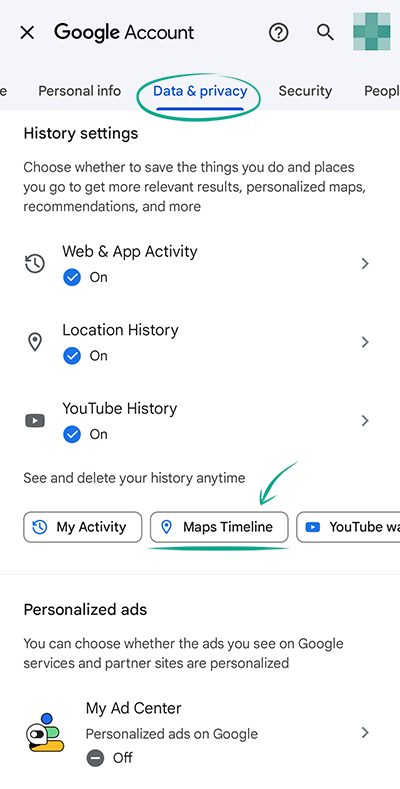
- Tap the three dots in the upper right corner of the screen and select Settings and Privacy;
- Tap Delete all Location History;
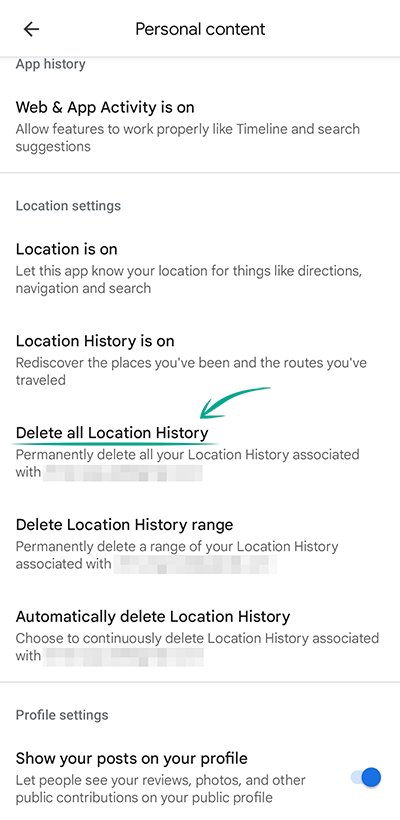
- Select the I understand and want to delete check box;
- Tap Remove.
You can also enable automatic deletion of data every 3, 18 or 36 months in the same section: To do so, do as follows while in the Settings and Privacy menu:
- Select Automatically delete Location History;
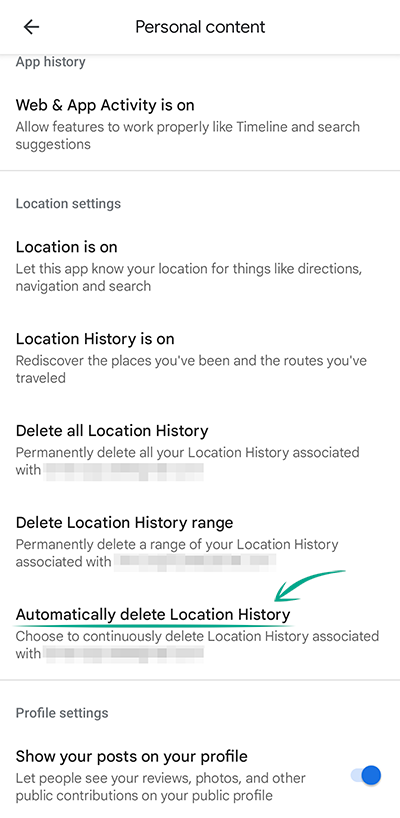
- Tick Auto-delete activity older than, and select among 3, 18, or 36 months, then tap Next;
- Tap Verify.
Downside: This prevents Google from creating albums that contain photos from specific locations. Also, the system will not be able to use information about places you visited to personalize ads and search.
What for: So that Google does not know what apps you use and what sites you visit.
By default Google collects information about your search queries, location, and app activities. This data is used to increase the accuracy of recommendations and personalization of Google services.
If you would prefer not to share this information, you can disable access to it:
- Open Settings on your device;
- Go to the Google section;
- Tap Manage your Google account;
- Scroll to the right until you get to the Data & privacy tab;
- Tap Web & App Activity under History settings;
- Tap Turn off;
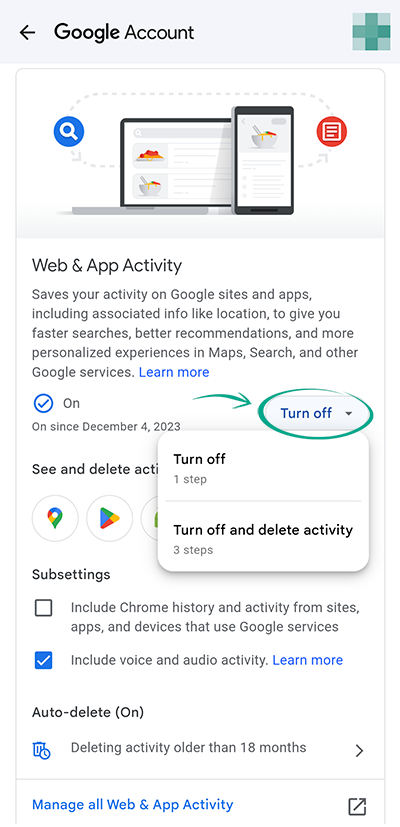
- Tap OK.
To turn off this feature and delete all data on your web and app activity, do the following instead:
- Open Settings on your device;
- Go to the Google section;
- Tap Manage your Google account;
- Scroll to the right until you get to the Data & privacy tab;
- Tap Web & App Activity under History settings;
- Tap Turn off, then Turn off and delete activity (3 steps);
- Tap Next;
- Select from the list the app activity that you want to delete and tap Next;
- Tap Remove;
- Tap OK.
To delete specific activity or to wipe data for a particular period, do the following in the Web & App Activity section:
- Tap View all;
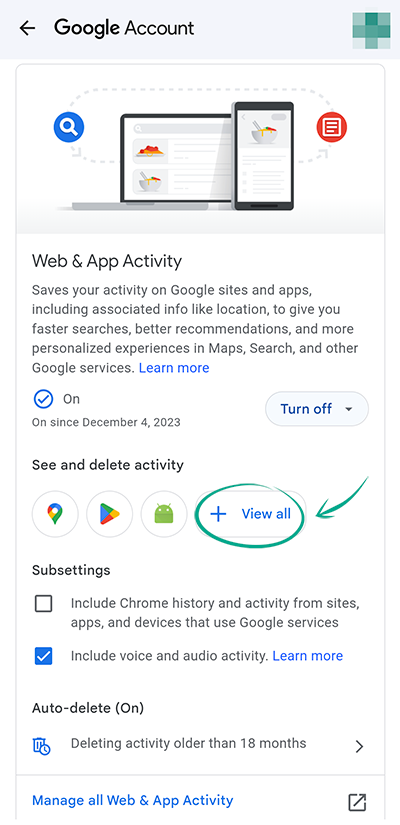
- Tap the cross to the right of the activity record that you want to delete and select Delete;
- To delete all activity for a particular day, tap Delete to the right of the filter;

- In the window that opens, select the period;
- Tap Remove.
To enable automatic deletion of data every 3, 18, or 36 months, do the following under Web & App Activity:
- Tap the Auto-delete button;
- Tick Auto-delete activity older than, select 3, 18, or 36 months, and tap Continue;
- Tap Confirm.
What for: So that Google does not know who you frequently talk to.
Google can save data about the contacts on the devices that you use to log in to your Google account. Such data includes not only phone numbers and e-mail addresses, but also information about how often you communicate with a particular person. Syncing data across devices is convenient, but the information can also be used to target advertising, and it can be shared with third parties such as Google affiliates. If you prefer not to share this information, prevent the data from being saved:
- Open Settings on your device;
- Go to the Google section;
- Tap Manage your Google account;
- Scroll to the right until you get to the People & sharing tab;
- Tap Contact info from your devices in the Contacts section;
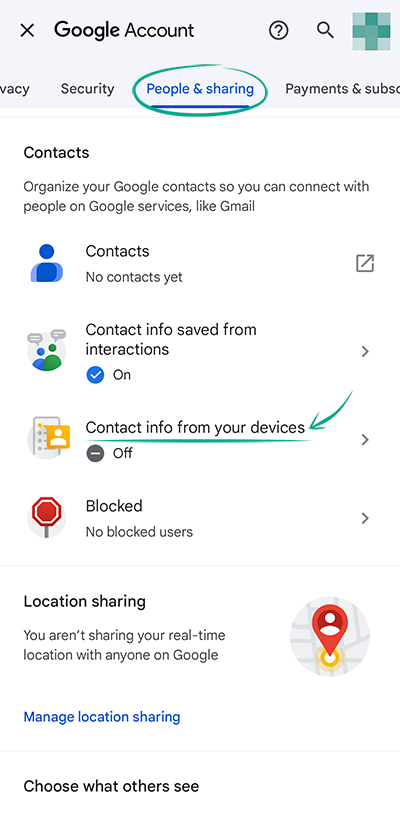
- Turn off the Save contacts from your signed-in devices feature.
Remember that other Google services and apps, such as the Contacts app, can save data about your contacts.
What for: So that Google does not know which videos you have watched.
Your account holds your YouTube search and watch history. This information can be used to target advertising, and it can be shared with third parties, such as Google affiliates. If you prefer not to share this information, prevent the data from being saved:
- Open Settings on your device;
- Go to the Google section;
- Tap Manage your Google account;
- Scroll to the right until you get to the Data & privacy tab;
- Tap YouTube History under Settings for history saving;
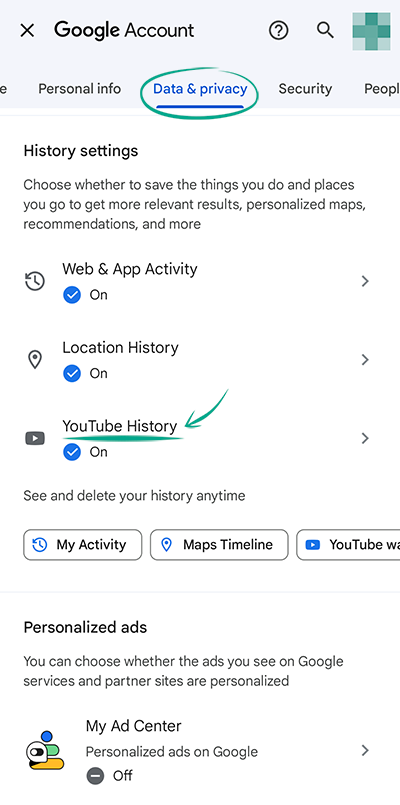
- Tap Disable;
- Tap Pause.
To completely delete your YouTube search and watch history, do as follows:
- Open Settings on your device;
- Go to the Google section;
- Tap Manage your Google account;
- Scroll to the right until you get to the Data & privacy tab;
- Tap YouTube History under Settings for history saving;
- In the YouTube history section, tap Manage activity;
- Tap Pause;
- Tap Remove;
- Select Delete all time;
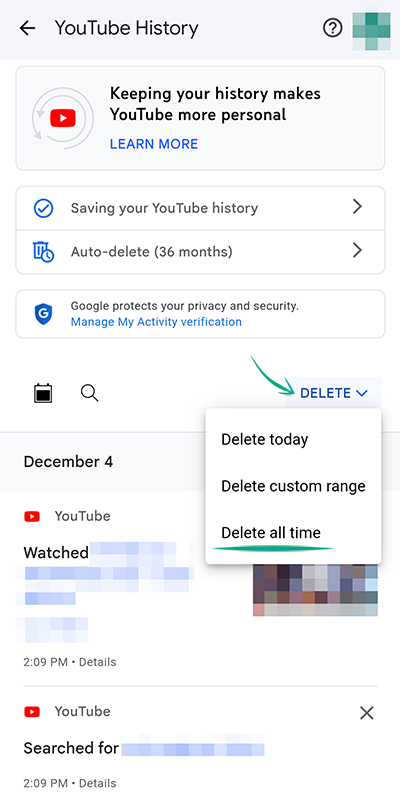
- Tap Remove.
To enable automatic deletion of data every 3, 18, or 36 months, perform the following steps on the YouTube History page:
- Tap the Auto-delete button;
- Tick Auto-delete activity older than, select 3, 18, or 36 months, and tap Continue.
What for: So that the developers of third party apps do not collect information about you.
Certain apps may request access to your account data, such as your date of birth, gender, and phone number. Developers use this information to show you targeted ads and to collect statistics about their audience. If you would prefer not to share this information, limit access to it:
- Open Settings on your device;
- Go to the Google section;
- Tap Manage your Google account;
- Scroll to the right until you get to the Security tab;
- Tap See all connections under Your connections to third-party apps & services;

- The window that opens lists the apps and sites that can use data in your Google profile. Select, one by one, the apps you want to prevent from viewing your information and tap See details. Now you can find out just what data the app is using and prevent it from doing so.
How to prevent your personal data from being exposed
What for: To keep strangers from learning too much about you.
Certain data — including your date of birth, gender, and phone number — from your account is visible to other users by default. To prevent strangers from viewing this information, deny access to it:
- Open Settings on your device;
- Go to the Google section;
- Tap Manage your Google account;
- Scroll to the right until you get to the Personal info tab;
- Scroll down the page and tap Go to About me;
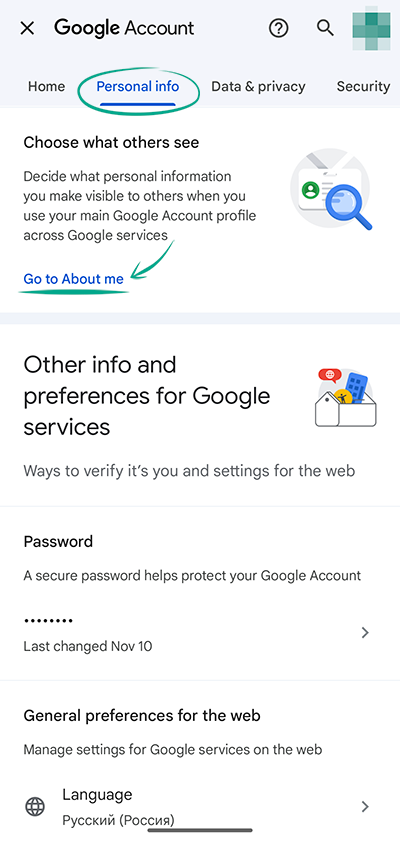
- Select the fields containing information that you want to deny access to, and specify that only you can see it.
You may not limit access to certain data, such as photos and names.
What for: To keep strangers from learning where you are.
Certain Google services can show your location to other users. By default, the feature is disabled. However, you can activate it by, for example, sending your current location to one of your contacts. We recommend reviewing who is allowed to access your location data and denying strangers access to it:
- Open Settings on your device;
- Go to the Google section;
- Tap Manage your Google account;
- Scroll to the right until you get to the People & sharing tab;
- Tap Manage location sharing in the Location sharing section;
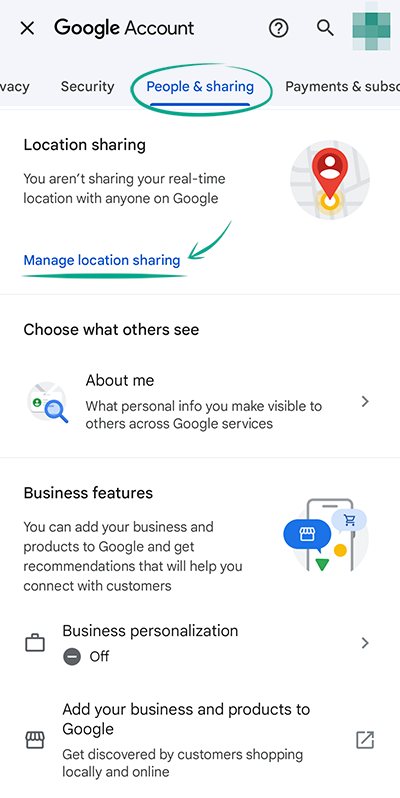
- Under What others can see, tap Stop next to the name of the user you want to prevent from accessing your location data.
What for: So that strangers cannot see your name and photos in ads.
Google can add user ratings and reviews on an advertised product or service to their ads (such as in paid search engine results). The profile photo and the name of the user who wrote the review or added the rating are published as well. If you do not want strangers to see your personal data in ads, disable this feature:
- Open Settings on your device;
- Go to the Google section;
- Tap Manage your Google account;
- Scroll to the right until you get to the People & sharing tab;
- Tap Manage shared endorsements in the Share recommendations in ads section;
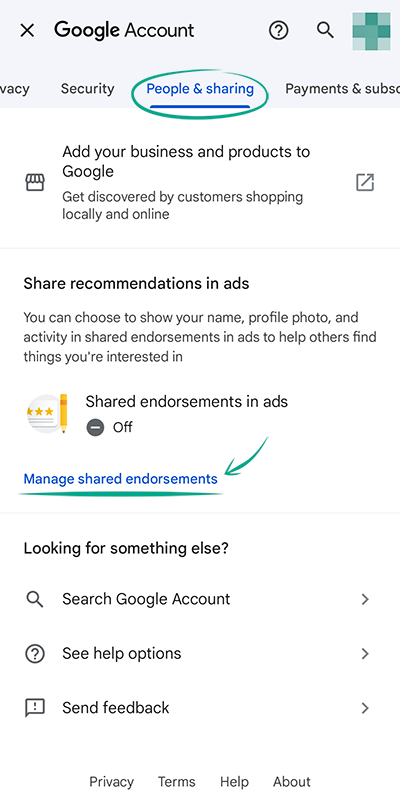
- Untick Based upon my activity, Google may show my profile name, profile photo, and activity in shared endorsements in ads, which is located at the bottom of the page.
Please note: Although the UI text mentions friends, the settings actually apply to all users.
Downside: If you disable the sharing of your recommendations, you will not see other people's ratings and reviews in ads.
How to protect your data
What for: To prevent data leaks and to not share your payment information with Google.
The Google Pay service lets you purchase goods using the card that is attached to your account. This can be convenient. However, if you add a payment method to your account, you are granting Google additional access to your data. For example, the company obtains the right to share your location data with your bank, and may transmit your payment data or even private information to third parties. Google also collects information about transactions and your account, including your card numbers, account numbers, and the totals of your transfers.
If you do not want your data to be stored in Google Pay, you can delete this data.
- Open Settings on your device;
- Go to the Google section;
- Tap Manage your Google account;
- Scroll right to the Payments & subscriptions tab;
- Under Payment methods, select Manage payment methods, and choose the bank card you want to delete;
- Tap the three dots in the upper right corner of the screen, select Remove payment method, and confirm;
- Select the services you want to remove the payment card from: Wallet or Wallet and Google Account.
Downside: You will not be able to use Google Pay.
What for: To securely protect yourself from data leaks.
Google Password Manager allows you to store your autofill data and use it to log in to third-party accounts. Thanks to synchronization, this feature is available on all devices logged in to your account. It also lets you verify the security of your passwords that are saved in your Google account.
That is very important: if you are using identical passwords on different websites, the theft or leak of one of them could result in several of your accounts being hacked at once.
How to start a scan:
- Open Settings on your device;
- Go to the Google section;
- Tap Manage your Google account;
- Scroll to the right until you get to the Security tab;
- Scroll down the page and tap Password Manager;
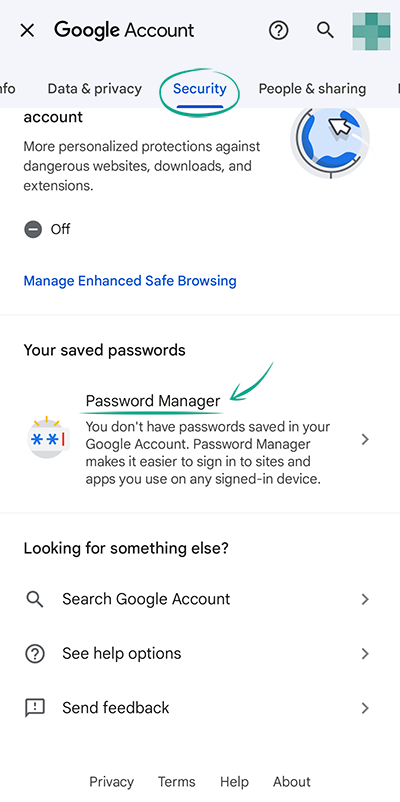
- Tap Check passwords and confirm your selection;
- Enter your account password if required to;
- Once the check is complete, you can view, edit, or delete any passwords that have been compromised, are duplicated, or are too easy to crack.
Even though the storage is protected, data leaks are always a risk. To reduce the risk, delete your passwords from your account. To do this, do the following for each website in the Password Manager menu:
- Tap the name of the web resource;
- If required, enter the password or confirm access to your smartphone otherwise;
- Tap Remove;
- Select Delete in the opened dialog window.
Note that you may have also saved account credentials in services other than Google Password Manager, such as your browser. They will still be available there.
If you delete your Autofill data, you will have to enter your password manually on websites and in apps each time you use them. To avoid the inconvenience, you can install a password manager with a reliable data encryption and security system. Kaspersky Password Manager, for one, does not use cloud services to store data: all your passwords are kept right there on the device. This app follows the principle of zero knowledge, which means your passwords are inaccessible to anyone but you, not even to the developer.
How to clean up your traces
What for: To maintain control over your data even if you decide to quit using your Google account.
If you stop using your account or lose access to it, all of your data will still remain on the company's servers. That means the videos you uploaded on YouTube will still be available, Google Photos will continue to store your photos, and so on. You can configure the system so that your Google account will be deactivated and all of your data will be deleted after a certain period of time:
- Open Settings on your device;
- Go to the Google section;
- Tap Manage your Google account;
- Scroll to the right until you get to the Data & privacy tab;
- Under More options, tap Make a plan for your digital legacy;

- Tap Get started;
- In the Decide when Google should consider your Google Account inactive section tap the Edit button and select the inactivity period after which your account should be deactivated. Google will send you a notification when the conditions are satisfied and your account will soon be deactivated;
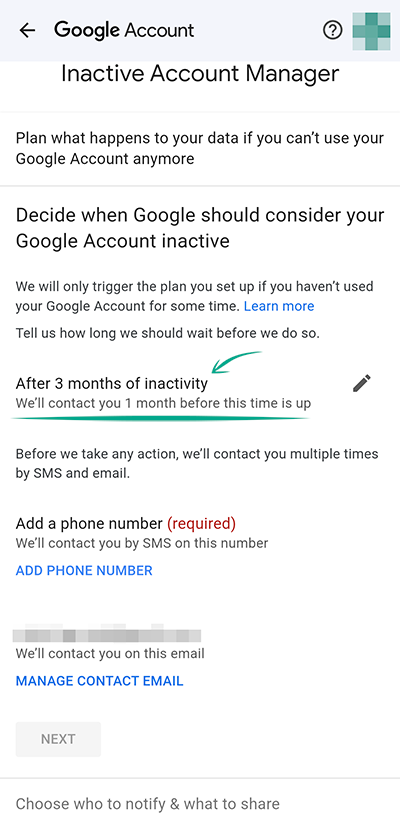
- Check the phone number, your main and backup e-mail addresses that Google will use to send messages about your inactivity. You should have access to all of them so that you do not miss the notification;
- Tap Next;
- Tap Add person and enter the email address of the person who will receive a notification if your account becomes inactive. If you want, indicate whether this person should be allowed to download an archive with your data, and what information it should contain;
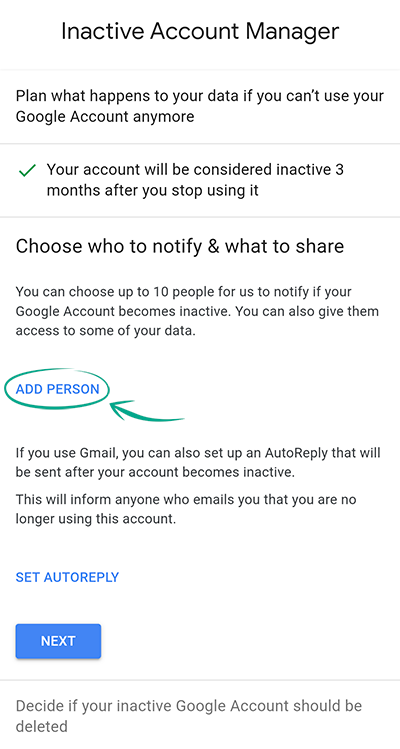
- Tap Next;
- You can specify the person's phone number and leave a personal message for them;
- Tap Save;
- Besides, you can set up an AutoReply. This will send an email message to everyone who writes to your email address after the account is deactivated;
- Tap Next;
- If you want, activate the toggle next to Yes, delete my inactive Google Account;
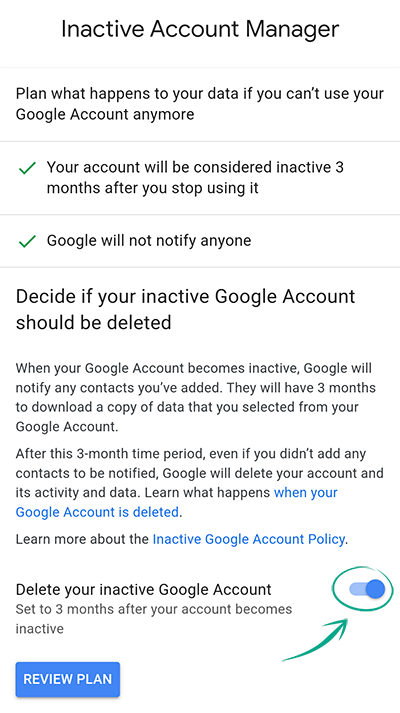
- Tap Confirm your plan, tick Receive email reminders that Inactive Account Manager is turned on and tap Review plan.
Remember that along with your Google account all data from connected services, such as YouTube, Google Photos, and others, will also be deleted.
What for: So that you do not lose any information if your account is hacked or blocked.
You can download a file with all of your Google profile data. With it, you can learn what kind of information the company collects about you as well as save it in case your account gets blocked or hijacked:
- Open Settings on your device;
- Go to the Google section;
- Tap Manage your Google account;
- Scroll to the right until you get to the Data & privacy tab;
- Tap Download your data under Download or delete your data;
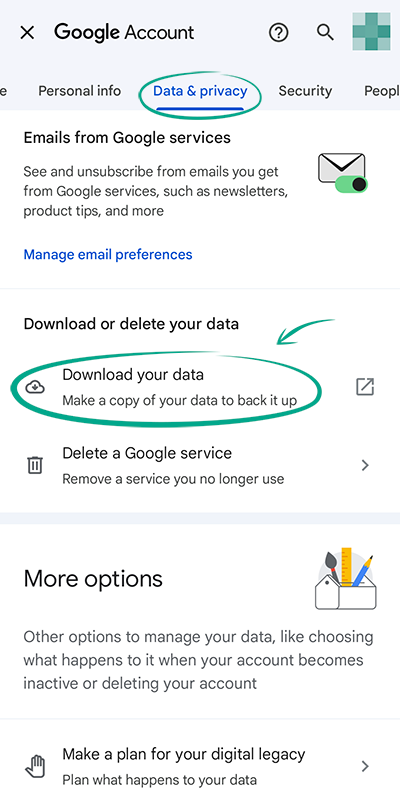
- Select the services you would like to download data from. All Google apps that you use are ticked by default;
- Tap Next;
- Select how you want to receive your data archive:
- Send download link via e-mail;
- Add to Disk;
- Add to Dropbox;
- Add to OneDrive;
- Add to Box.
- Select how frequently you would like to back up your data. You can create a one-time backup or generate an archive every two months for one year;
- Change the file format if you want. By default, Google will send you a ZIP file archive. However, if the size of the backup copy exceeds 2 GB, you will receive it in several parts or in ZIP64 format. Please note: not all operating systems support. Using the alternative TGZ format enables creating archives up to 50 GB in size;
- Select the maximum size of a single file archive. If the total size of the archive exceeds this limit, Google will send it in several files;
- Tap Create export.
Depending on the amount of data you request, generating the archive may take anywhere from several hours to several days. When the file is ready, you will receive a download link by e-mail.







